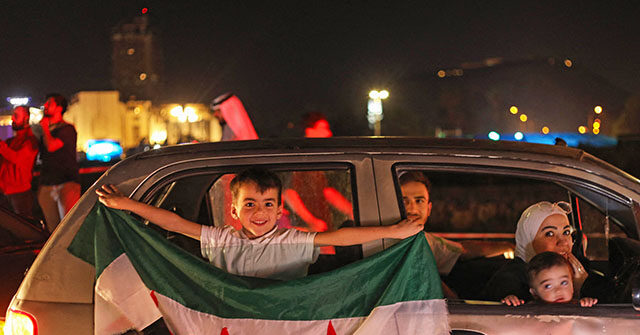President Donald Trump on Monday signed an executive order terminating all U.S. sanctions on Syria, to “support the country’s path to stability and peace.”
Trump’s order removed sanctions on the nation and new government of Syria, but maintained those targeting former dictator Bashar Assad personally, along with “his associates, human rights abusers, drug traffickers, persons linked to chemical weapons activities, ISIS or its affiliates, and Iranian proxies.”
After seemingly winning his brutal decade-long struggle to remain in power with heavy assistance from Russia and Iran, Assad was suddenly overthrown in a lightning-fast December 2024 offensive led by Hayat Tahrir al-Sham (HTS), a former al-Qaeda group.
In this photo released by the Saudi Royal Palace, President Donald Trump, right, shakes hands with Syria’s interim President Ahmad al-Sharaa, in Riyadh, Saudi Arabia, May 14, 2025. (Bandar Aljaloud/Saudi Royal Palace via AP)
The head of the post-Assad “interim government,” former al-Qaeda lieutenant Ahmed al-Sharaa, met with Trump in Saudi Arabia and made a positive impression on the president.
Trump said after the meeting he would lift longstanding U.S. sanctions against Syria to help postwar rebuilding get underway and alleviate the massive refugee crisis caused by the civil war.
The Treasury Department quickly issued a license for Syria’s central bank and state-owned enterprises to conduct financial transactions banned under Assad, while the State Department issued a 180-day waiver on sanctions.
The waiver would have expired in August, but Trump’s order made the lifting of sanctions permanent. Many of the now-defunct sanctions were imposed by Trump during his first term, targeting entities that were “actively supporting the murderous and barbaric Assad regime.”
Trump’s executive order on Monday also relaxed “export controls on certain goods,” waived “restrictions on certain foreign assistance to Syria,” and directed Secretary of State Marco Rubio to “explore avenues for sanctions relief at the United Nations to support stability in Syria.”
“President Trump is committed to supporting a Syria that is stable, unified, and at peace with itself and its neighbors,” the White House said.
The White House made it clear that Syria’s new government was expected to take strong measures against terrorism, avoid “empowering harmful actors,” maintain regional stability, and assist with “holding accountable those responsible for past atrocities or terrorism.”
President Trump is putting some heavy bets on Sharaa and his interim government and the jackpot could be Syria normalizing relations with Israel.
U.S. officials say “very quiet preliminary talks” for a bilateral security deal are underway and Israel hopes that could lead to normalized relations. Such a normalization would be a dramatic expansion of President Trump’s Abraham Accords that would have been unthinkable a year ago, with Assad firmly seated upon his bloody throne and Iran spreading its malign influence across the Middle East.
Trump’s executive order doubled down on his bet by instructing the State Department to review the designation of HTS as a foreign terrorist organization (FTO), Sharaa’s personal designation as a Specially Designated Global Terrorist, and Syria’s designation as a state sponsor of terrorism.
Hayat Tahrir al-Sham began as Jabhat al-Nusra, commonly known as the Nusra Front, al-Qaeda’s franchise in Syria. The group rebranded itself as HTS in 2017, seeking to distance itself from its al-Qaeda roots and project a new identity as a Syrian nationalist militia opposed to the Assad dictatorship.
The Nusra Front was designated an FTO in May 2014. In June 2018, during the first Trump administration, the State Department added HTS to the existing FTO designation for the Nusra Front.
The State Department added Sharaa to its list of Specially Designated Global Terrorists in May 2013, using his terrorist alias “Mohammed al-Jolani.”
The State Department noted that Sharaa was “considered the leader of al-Nusra” and had “stated in videos that his ultimate goal is the overthrow of the Syrian regime and the institution of Islamist sharia law throughout the country.” He also made a personal pledge of allegiance to al-Qaeda leader Ayman al-Zawahiri in 2011.
Under Sharaa’s leadership, the Nusra Front “carried out multiple suicide attacks throughout Syria,” and many of those attacks “killed Innocent Syrian civilians.”
The State Department said Sharaa’s leadership of the Nusra Front was “at odds with the aspirations of the Syrian people” to establish a “free, democratic, and inclusive Syria” that “respects and advances national unity, dignity, human rights, and equal protection under the law.”
Syria was designated a state sponsor of terrorism in December 1979, during the reign of Hafez al-Assad, the first of what would turn out to be two dictators in the Assad dynasty.
Hafez Assad provided training camps for militant groups, including Palestinian terrorist gangs and Lebanese Hezbollah. He also supplied them with intelligence and logistical assistance, turning terrorist gangs into his agents of influence across the Middle East.
The terrorist landscape has changed. HTS has long fought the Islamic State for turf, a rivalry that continues as ISIS tries to regain its strength and challenge Sharaa’s interim government. Support from the U.S.-led coalition against ISIS is extremely valuable to Damascus in that endeavor.
Sharaa has not really given up on his ambition to create an Islamist state under sharia law in Syria, but he markets his government as a kinder, gentler, more inclusive brand of Islamism, offering respect and protection for Syria’s many non-Muslims and non-Sunni-Muslims.
The HTS regime has solid reasons for convincing Western powers it can responsibly govern Syria and pave the way for free and fair elections in a few years. NATO member Turkey has taken Damascus under its wing, urging the rest of the world to give the new government a chance – and urging Sharaa to take Turkey’s security concerns in Syria very seriously.
Trump’s executive order on Monday was a bold gesture of confidence that Sharaa can deliver on his promises and hold post-Assad Syria together. The stakes for the region, and for the Syrian people, are incredibly high.
Read the full article here


